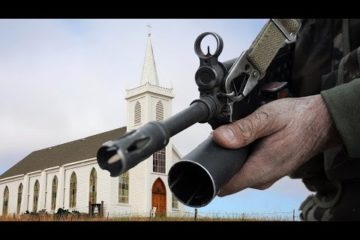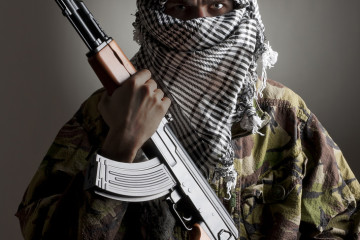Obama’s ‘New Phase’ of Terror Threat Among Hardest to Defeat

©2015 Bloomberg News
NYYYIV6K50XT
NYYYIV6K50XT
(Bloomberg) — President Barack Obama warned that the mass shooting in California last week showed the terrorist menace has evolved into a “new phase” of less sophisticated, harder to detect plots, while assuring the public that organizations like Islamic State that threaten the U.S. will be destroyed.
What Obama didn’t say is that this evolving threat is among the most difficult to stop.And that was the central tension in Obama’s 13-minute speech, a pledge to defeat Islamic State wrapped around an acknowledgment that the terrorism it inspires keeps growing as a threat.
Yet it was a speech he was pressured to make. After criticism even from some liberal allies that his statements following attacks in Paris and California didn’t demonstrate sufficient urgency, Obama addressed the nation from the Oval Office, a setting he has only used twice before and one presidents traditionally reserve for moments of crisis.
Obama outlined a stepped-up campaign abroad of air strikes and special forces deployments against Islamic State strongholds in Iraq and Syria but offered no new plans for action or strategic shifts.
Lone Wolf
In the campaign at home, Obama described the San Bernardino, California attackers as radicalized Muslim-Americans who became lone-wolf terrorists. At the same time, he pleaded with Americans to avoid targeting or denigrating Muslims, which he said would risk undercutting efforts to prevent future attacks.
Syed Rizwan Farook and his wife, Tashfeen Malik, were inspired by Islamic State ideology though not directed by the extremist group, when they opened fire on a office holiday party in San Bernardino, killing 14 and wounding 21. That followed other attacks by so-called lone wolves at Fort Hood in 2009, Texas, and at the Boston Marathon in 2013.
“As we’ve become better at preventing complex multifaceted attacks like 9/11, terrorists turn to less complicated acts of violence like the mass shootings that are all too common in our society,” Obama said. “We see growing efforts by terrorists to poison the minds of people like the Boston Marathon bombers and the San Bernardino killers.”
Unique Challenge
Home-grown extremists are difficult to uncover and pose a unique challenge for law enforcement and intelligence officials, said James McJunkin, a former top counter-terrorism agent at the FBI.
“They are living inside the community and they are doing this in the privacy of their homes and who, despite popular belief, are not being monitored by the government,” McJunkin said. “Detection becomes the issue.”
In more organized terrorism plots, there is likely to be more frequent communication among members and therefore a higher chance they will be detected, he said.
Close relatives like Farook and Malik and the brothers behind the Boston Marathon bombing present greater challenges because their bonds can be tight and their communication is often in-person.
Less Effective
Though attacks by independently operating extremists may be harder to detect, they are less likely to produce the large- scale casualties that traditional terror networks can inflict through complex operations, McJunkin said. Lone wolves generally don’t have much training, direction or help with planning.
Farook and Malik appear to have become radicalized in recent months, or years, though the precise evolution of their extremist views remains a mystery. Agents are combing through the couple’s phone records, computers and phones seeking clues as to what happened and anyone they may have been working with.
The fear and anger terrorist attacks naturally stoke in the broader public, as well as calls for crackdowns that alienate ethnic and religious communities, inevitably undermine one of law enforcement’s best counter-terrorism tools. Relationships with terrorists’ communities are essential to unraveling plots before they develop, as friends, family members and neighbors are most likely to first notice suspicious behavior.
Countering the impulse to discriminate was one reason President George W. Bush visited a mosque soon after the Sept. 11 attacks and why he regularly declared that his War on Terror was not directed against the broader Islamic faith.
Muslim-Americans
Obama stressed the theme in his address.”We cannot turn against one another by letting this fight be defined as a war between America and Islam,” Obama said. “We must enlist Muslim communities as some of our strongest allies, rather than push them away through suspicion and hate.”
Home-grown terrorists instill greater fear precisely because they could be anyone to whom radical Jihadism would appeal and because their attacks often are directed at unpredictable targets of opportunity.
“I know that we see ourselves with friends and co-workers at a holiday party like the one in San Bernardino,” Obama said. “Muslim Americans are our friends and our neighbors, our co- workers, our sports heroes — and, yes, they are our men and women in uniform who are willing to die in defense of our country. We have to remember that.”
The Paris and San Bernardino attacks come as several leading candidates in the Republican presidential primary have blamed outsider groups for threatening America’s economy and security.
A central tenet of Republican front-runner Donald Trump’s presidential campaign has been to pinpoint undocumented immigrants as contributors to middle-class economic insecurity and criminal violence. In the aftermath of the Paris and San Bernardino attacks, he also has argued that counter- terrorism efforts have been hampered by too much sensitivity to alienating Muslims.
In an interview broadcast Sunday on CBS’s “Face the Nation,” Trump said people have been too risk-averse in dealing with Muslims in America. People knew what the San Bernardino attackers were planning, he argued, but didn’t want to report them for fear of appearing to profile them.
“So everybody wants to be politically correct, and that’s part of the problem that we have with our country,” he said.
Other Republican candidates, such as Florida Senator Marco Rubio and New Jersey Governor Chris Christie, have sought to reopen the debate on government surveillance of Americans’ telephone and electronic communications, which much of the public turned against in the wake of revelations by fugitive former contractor Edward Snowden about the extent of monitoring.
Even before the San Bernardino shootings the public mood had swung. In a Quinnipiac poll taken Nov. 23 through Nov. 30, after the Paris attacks, 61 percent of Americans said they were more concerned the government does not go far enough in surveillance. Twenty-one percent worried the government goes too far. In January 2014, 51 percent worried government surveillance goes too far, versus 31 percent who said it wasn’t extensive enough.
–With assistance from Justin Sink and Angela Greiling Keane.
To contact the reporters on this story: Mike Dorning in Washington at mdorning@bloomberg.net; Del Quentin Wilber in Washington at dwilber@bloomberg.net To contact the editors responsible for this story: Joe Sobczyk at jsobczyk@bloomberg.net Alex Wayne
Tags:Boston MarathonISILISISMuslim AmericansSan BernandinoSyed Rizwan Farook and his wifeTashfeen Malik







No Comment